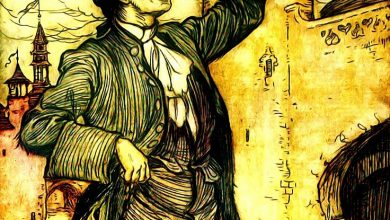Neo-Imperialism in One Hundred Years of Solitude.
Capitalism, Colonialism and American Imperialism in One Hundred Years of Solitude

American Neo-Imperialism in One Hundred Years of Solitude.
Gabriel Garcia Marquez’ One Hundred Years of Solitude with its cyclical notion of time intricately interweaves the threads of past, present and future to unravel among other things a poignant sight of exploitation and degradation in an expansive yet intimate account striding seven generations of Buendías. The novel is something of a historical account and something of a private diary of an entire deprived region which has suffered deprivations and depredations by supposedly “advanced civilizations”.
The theme of isolation and contact and a hopelessly futile attempt at maintaining a healthy balance between the two undergirds the entire length of the novel. It is this unattainable balance which keeps on spawning its own monsters that come to haunt time and again the seven generations of the family. One sees this in the fallout of Neo Imperialism as being linked to the scientific “discoveries” presented by the gypsies on a previously isolated Macondo as well as in a Fernanda’s murdering a foreigner Mauricio Babilonia to keep his hands off Meme spawning the scenario where a nephew and his aunt are hopelessly fated to fail in keeping their hands off each other.
The sense of wonder, the enchantment with scientific novelty is another theme that requires exploration. A factoring in of the above two themes is vital if one is to come to grips with the effect of American Imperialism in One Hundred Years of Solitude.
Macondo’s history is in many ways the history of Colombia and Latin America in general, one which has been ascribed by the presence of colonialism. The events leading to the founding of Macondo and the culmination of atrocities in the form of Banana Massacre both are informed by imperialism. While the former is reflected in the conquest of Riohacha by Francis Drake, the latter demonstrates the ruthlessness of Neo Imperial American capital.
The sense of wonder captured in José Arcadio Buendía’s interaction with the gypsies through strange objects (like ice and magnet ) initially captivate and later hold captive the very people to whom it is presented. In this context, Stephen Greenblatt’s Marvelous Possessions provides a glimpse of the historical precedents of how people like Columbus and Hernán Cortés deprived many tribes of the Americas by occupying their lands in exchange of trifles like caps and horses. American imperialism was later to benefit from such enchanting and unequal interactions and the contact-distance equilibrium which is upset by the first generation manifests in a devouring transfiguration, as in case of Segundo’s experience with the machine guns, thereby bringing history to a complete circle.
While the contact with the gypsies had been of a relatively benign nature, that with someone like Mr Brown is radically different. Though it anchors itself on goodwill originated in an act of hospitality shown to Herbert, it quick devolves into that of dominance- submission relationship by the time Brown enters the scene.
The closing of distance between Macondo and the outer world by American Imperialism takes place in highly unequal terms and with malicious intent. In this regard,the introduction of railroads in Macondo is of great significance not only due to the consequent economic exploitation of Macondo but also due to the very nature of this encounter which is significantly different from the sense of wonder on discovering ice. What earlier generated a sense of awe changes to that of positive bewilderment when a woman panics while describing a train :
“Something frightful, like a kitchen dragging a village behind it.”
It isn’t an interaction of mutually curious parties but that of one actively seeking to exploit the other. Macondo is pierced by the iron tracks of the railway which shatters the the city of mirrors, one crack at a time.
Imperialistic monopoly is exemplified by the construction of railway tracks which was historically set up by the United Fruit Company for the exclusive transport of fruits to the US. The appreciative and benign mask of American Imperialism in the character of a seemingly benign Herbert soon gives way to the actual face behind the mask : that of Mr Brown who uses the military to massacre three thousand workers without any impunity.
The imperialistic system with its professionals like lawyers and engineers create a magical web from which the hapless inhabitants of Macondo cannot break free. This sense of bewilderment is captured when the labourers are unable to pin down Mr Brown, who , with the aid of lawyers and the legalistic system this created, manages to free himself by setting up false alibis and imposters:
“The decrepit lawyers dressed in black who now were controlled by the banana company dismissed those demands with decisions that seemed like acts of magic.”
Finally, this abstract legal system is able to completely deny the existence of actual workers. Reason is supposedly used to aid unreasonable acts of injustice:
“By a decision of the court it was established and set down in solemn decrees that the workers did not exist.”
It is as if the decrees of law are indeed magic spells which actually make the workers vanish altogether in one great disappearing act.
The United Fruit Company ( represented by the Banana Company in the novel) had been so notorious for its predatory behaviour that it was nicknamed El Pulpo ( the octopus) which spread its tentacles wherever it could squeeze out the last penny from the people. Interestingly, another American imperial company to share the same nickname was Standard Oil whose insatiable depredations have been recounted by another Latin American literary giant Pablo Neruda in his poem Standard Oil Co:
Their obese emperors from New York
are suave smiling assassins
who buy silk, nylon, cigars
petty tyrants and dictators.They buy countries, people, seas, police, county councils,
distant regions where the poor hoard their corn
like misers their gold:
the Paraguayan fights its war,
and the Bolivian wastes away
in the jungle with its machine gun.
What holds true for Standard Oil holds true for the Banana Company , the likes of which set up numerous Banana Republics in Latin America and slaughtered people for pennies.
The uniformity of Imperial experience which leaves no place for diversity or dissent is exemplified by the very nature of banana monoculture plantation which uses clones of a single variety to cut costs and extract the most from the labourers by making them work in subhuman conditions. The utter exploitation of residents of Macondo is complete when 3000 plantation workers are massacred for demanding basic amenities and an actual payment for their the labour. The sheer brutality of the event in the novel which captured the horrors of the 1928 Cíenaga Banana Massacre is encapsulated in a disconcerting line of disbelief:
” But it all seemed like a farce. “
The dehumanisation of people is complete when the massacre is described as “peeling of an onion with machine guns” and later their dead bodies are flung into the sea ” like rejected bananas”.
The greatest tragedy is that nobody remembers the reprehensible act and the Banana Company is able to wipe out any signs of its atrocities. The collective amnesia is reinforced when the company later organizes a three day festival, as if nothing happened. In reality, The United Fruit company had set up radio stations as organs of propaganda to wipe out its flaws. The powers of the company seem virtually unlimited in the novel when a deluge descends for 4 years 11 months and two days after the massacre, removing any trace of the crime. The floods drown out the plantations, the company shifts and no proof of the event remains whether in a physical form or in memory, save that of José Arcadio Segundo who retreats in the unspeakable solitude of sorrow of a person who, dejectedly, suffers a solitary survival.
To Cite this article, copy the link below :
https://litbug.com/2020/12/02/neo-imperialism-in-one-hundred-years-of-solitude/
Works Cited and Referred
1. Marquez, Gabriel Garcia – One Hundred Years of Solitude, Avon Books
2. Neruda, Pablo, Standard Oil Co. Canto General, 1940
3. Greenblatt, Stephen – Marvelous Possessions: The Wonder of the New World, University of Chicago Press; 1st Edition
4. Aizenberg, Edna – Historical Subversion and Violence of Representation in García Márquez and Ouologuem, Modern Language Association
5 De Casto, Juan E .- Cultural Contact, Modernization, and Imperialism in One Hundred Years of Solitude
6.Sangari, Kumkum – The Politics of the Possible, University of Minnesota Press
7. Glaser, Jason – Banana Land: Blood, Bullets and Poison : A Documentary





Thoroughly impressed by this essay. One Hundred Years of Solitude is such a gem.